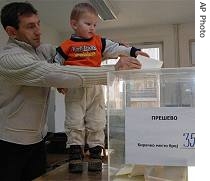2007年VOA标准英语-Serbians Vote in First Parliament Election in T(在线收听)
Belgrade
21 January 2007
 |
| An ethnic Albanian man casts his ballot with his son at a polling station in Presevo, 21 Jan 2007 |
Citizens of Serbia are casting ballots in the country's first parliamentary election since neighboring Montenegro withdrew from its federation with Serbia last year. VOA's Barry Wood reports from Belgrade that good weather may be boosting voter turnout beyond the 59 percent recorded in December 2003.
In Belgrade sunny skies and warm temperatures made this election day feel more like spring than winter.
Polling stations in the capital registered a brisk early turnout, but by mid-afternoon no lines were apparent in the city center. The mood is relaxed, with some voters saying the election is unlikely to have much impact.
Several hundred international observers are monitoring the election. Voters are choosing a 250-seat parliament. More than six million people are eligible to vote at 3,000 polling stations across the country.
In the southern province of Kosovo only the minority Serbs are casting ballots.
No single party is expected to gain a majority, but analysts are watching to see which of the three largest parties will do best.
It has been expected that the nationalist Radical Party, whose leader is on trial for war crimes, would be the largest vote-getter with up to 30 percent support. But the Democrats of President Boris Tadic have been making advances and could challenge the Radicals. Prime Minister Vojislav Kostunica's conservative Democratic Party of Serbia is expected to get about 20 percent of the vote.
Barring a major surprise, the next government is likely to be a coalition comprising the president and prime minister's parties with additional support from smaller groupings.
While economic issues dominated the campaign, Kosovo's future status has loomed large. A U.N. envoy is expected to soon propose measures that could lead to independence for the territory, which is the wish of Kosovo's 90 percent ethnic Albanian majority.
All of the three major Serbian parties oppose independence, but they do not advocate military action against the NATO-led forces stationed in Kosovo.
Preliminary results from the Serbian election are expected not long after voting ends.